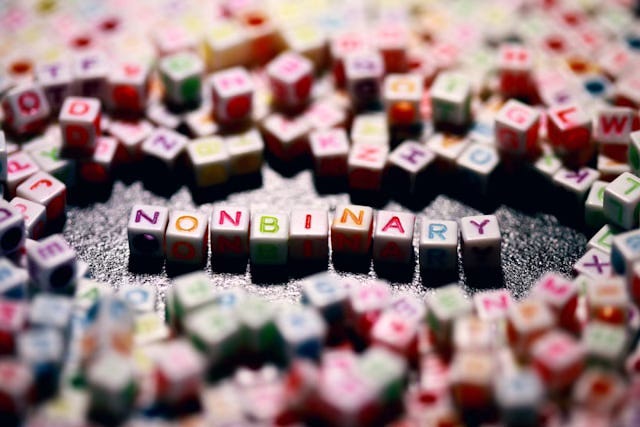Recently I shared a few details about my next book, including the info that it’s a love story between a “he” and a “they.” One friend emailed me thus:
Interesting that you have written a “they” character. I just had my first experience reading a novel that used a “they” character. Honestly, it drove me a little crazy, and I don’t see how it contributes to the work. It’s one thing to watch a movie/TV show that has a character referring to self as “they”, but in literature…I’m not a fan. At least not yet. Is there a purpose other than to create awareness and inclusion of that population? I’m open to being enlightened.
After ruminating on that awhile, I composed an answer. In some cases this would be a prime “It’s not my job to educate you” situation, but I know her to be a reasonably progressive-minded person, and she did say she was open to being enlightened, so perhaps this was a useful teaching moment. What I sent back:
My reasons for having “they” characters:
Because my trans and nonbinary friends are among the wisest, kindest, most patient people I know, and they deserve to have book protagonists representing them.
Because allowing more than two genders gives Presidents Musk and Trump hives, along with anyone else who worships the patriarchy, and I’m going to write what I like, not what they like. [I was already writing this character as “they” long before the election, but now it has become RESISTANCE to write such a character. Apparently. Not how I wanted the world to be, but here we are.]
Because being nonbinary [or choosing to go by “they” even if you aren’t nonbinary] is not a recent Gen-Z TikTok trend; it’s something lots of human cultures have done for millennia, especially Indigenous cultures. Most of which were wiped out and/or suppressed by colonialism, which in turn was a force of, you guessed it, patriarchal cultures.
Because it’s already established practice in the Eidolonia universe—there have already been some “they” characters in the first two books. In a world that has quite a lot of shape-shifting and magic-using life forms, a human going by “they” would not make anyone bat an eyelash.
Because if getting to know one of my “they” characters helps even just one reader out there feel more familiar and friendly with real-life nonbinary people—as fictional characterization can often do, for people we once perceived as “other”—then it will have been worth it.
I fully admit that using “they” did take some getting used to at first. But with enough practice it began feeling natural, and now I don’t stumble over it like I initially did. I’m almost 50 and I have trained my mind to be flexible, and it has felt good. Others can too.
There’s loads of good reading on the topic out there; e.g., see this post by sex educator and researcher Emily Nagoski, for starters. Or this article on the historical worldwide existence of gender identities beyond the binary. And lots more out there if you go searching.

—
I am relieved to say that this friend answered graciously, thanking me for taking the time to explain.
This topic is one I could go on and on about, reaching way back into my college days in the nineties, when I became fascinated with both the gender fluidity I learned about in anthropology and the queer literature I learned about in English, as well as just from browsing cool bookstores. Gender and sexuality, and the questioning and playing-with thereof, are subjects I have freaking loved for pretty much my entire adult life, since well before TikTok or the rest of the internet. And I not only believe but know that our society could do better than this tepid, tedious, mostly-patriarchy thing we have going on. Don’t be scared to learn! It’s actually really cool and freeing!
And “they” does get easier if you’re willing to give it a chance. (Speaking of “going on and on about it,” there’s the linguistics side: The fact that English doesn’t have any other gender-neutral third-person-singular pronoun is just a quirk of our particular language. Some languages do have one; we just don’t happen to. It is not a Pronouncement From On High About How Things Should Be. It’s just a detail shared by English and other highly gendered languages, and not shared by many less-gendered languages. Although patriarchy probably has something to do with all that too.)




ngl I totally appreciate you taking the time to explain to your friend, for a LOT of reasons - primarily because it gets SO DAMN EXHAUSTING having to do it myself, especially when it sure feels like someone who's otherwise pretty cool would rather deny my existence than expand their world a little bit. I'm really glad she reacted well! I probably woulda been like 'because we EXIST' & stomped off to have a good cry.